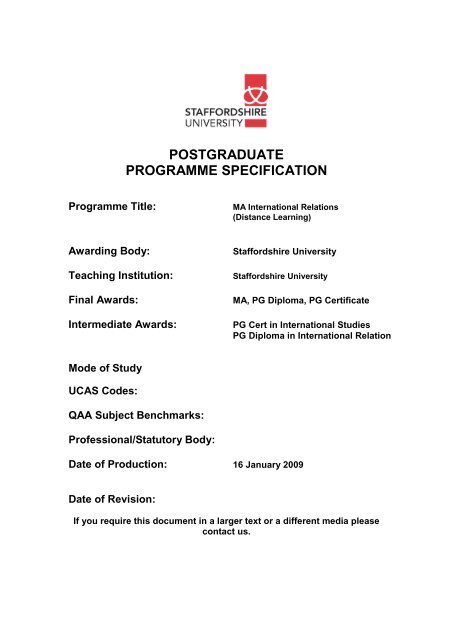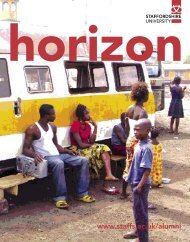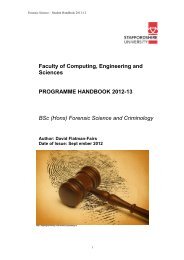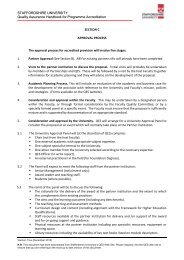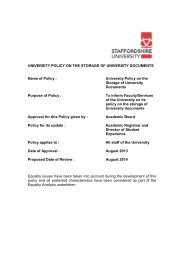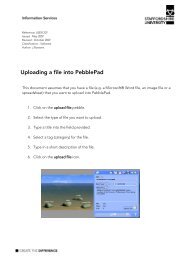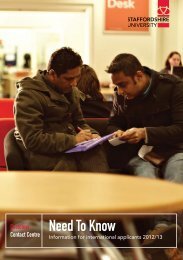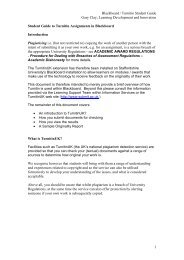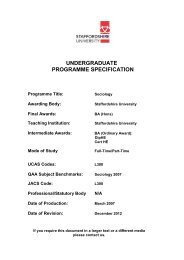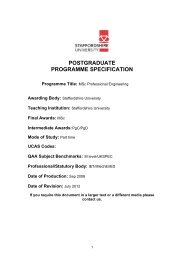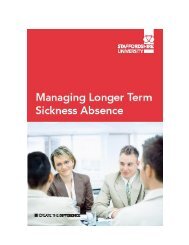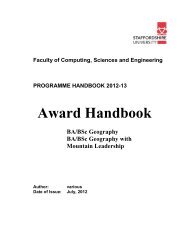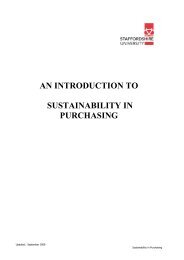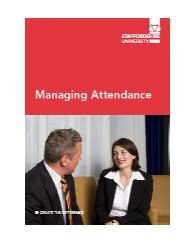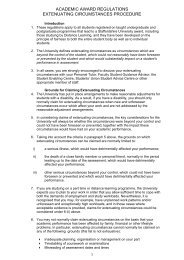MA International Relations (Distance Learning) - Staffordshire ...
MA International Relations (Distance Learning) - Staffordshire ...
MA International Relations (Distance Learning) - Staffordshire ...
You also want an ePaper? Increase the reach of your titles
YUMPU automatically turns print PDFs into web optimized ePapers that Google loves.
POSTGRADUATE<br />
PROGRAMME SPECIFICATION<br />
Programme Title:<br />
<strong>MA</strong> <strong>International</strong> <strong>Relations</strong><br />
(<strong>Distance</strong> <strong>Learning</strong>)<br />
Awarding Body:<br />
Teaching Institution:<br />
Final Awards:<br />
Intermediate Awards:<br />
<strong>Staffordshire</strong> University<br />
<strong>Staffordshire</strong> University<br />
<strong>MA</strong>, PG Diploma, PG Certificate<br />
PG Cert in <strong>International</strong> Studies<br />
PG Diploma in <strong>International</strong> Relation<br />
Mode of Study<br />
UCAS Codes:<br />
QAA Subject Benchmarks:<br />
Professional/Statutory Body:<br />
Date of Production: 16 January 2009<br />
Date of Revision:<br />
If you require this document in a larger text or a different media please<br />
contact us.
EDUCATIONAL AIMS OF THE PROGRAMME<br />
PROGRAMME OUTCOMES<br />
What will this programme teach me to do? At the end of your studies you should be<br />
able:<br />
Postgraduate Certificate<br />
Locate and analyse developments in IR theory as a series of intellectual debates in<br />
the context of changing twentieth century events (knowledge & understanding;<br />
learning; enquiry; analysis)<br />
Analyse the changing nature of diplomacy in the context of globalisation and the<br />
growth of international organisations (knowledge & understanding; learning; enquiry;<br />
analysis; application)<br />
Understand the key functions that global policy forums have served in the past and in<br />
the present (knowledge & understanding; learning)<br />
Apply appropriate skills of research (for individual assignments) with awareness of<br />
methodological problems using secondary sources (knowledge & understanding;<br />
learning; enquiry; analysis; problem solving; application; reflection)<br />
Demonstrate a level of communicative skill appropriate for the Masters level utilising<br />
standard notational and referencing conventions (communication)<br />
Postgraduate Diploma<br />
Locate and analyse developments in IR theory as a series of intellectual debates in<br />
the context of changing twentieth century events (knowledge & understanding;<br />
learning; enquiry; analysis)<br />
Demonstrate a critical understanding of a range contemporary theoretical<br />
perspectives in <strong>International</strong> <strong>Relations</strong> as a discipline (knowledge & understanding;<br />
learning; enquiry; analysis; communication; application<br />
Critically engage with the substance of key debates in the contemporary study of<br />
<strong>International</strong> <strong>Relations</strong> (knowledge & understanding; learning)<br />
Analyse the changing nature of diplomacy in the context of globalisation and the<br />
growth of international organisations (knowledge & understanding; learning; enquiry;<br />
analysis; application)<br />
Locate practical research problems against focused exercises and sustained<br />
research tasks (knowledge & understanding; learning; enquiry; application; reflection)<br />
Apply appropriate skills of research (for individual assignments) with awareness of<br />
methodological problems using secondary sources (knowledge & understanding;<br />
learning; enquiry; analysis; problem solving; application; reflection)<br />
Demonstrate a level of communicative skill appropriate for the Masters level utilising<br />
standard notational and referencing conventions (communication)<br />
Masters<br />
Locate and analyse developments in IR theory as a series of intellectual debates in<br />
the context of changing twentieth century events (knowledge & understanding;<br />
learning; enquiry; analysis)<br />
Demonstrate a critical understanding of a range contemporary theoretical<br />
perspectives in <strong>International</strong> <strong>Relations</strong> as a discipline, applying these at a more<br />
sustained level in the dissertation (knowledge & understanding; learning; enquiry;<br />
analysis; communication; application)<br />
Critically engage with the substance of key debates in the contemporary study of<br />
<strong>International</strong> <strong>Relations</strong> (knowledge & understanding; learning; enquiry; analysis;<br />
application)<br />
Analyse the changing nature of diplomacy in the context of globalisation and the<br />
3
growth of international organisations (knowledge & understanding; learning; enquiry;<br />
analysis; application)<br />
Locate practical research problems against focused exercises and sustained<br />
research tasks (knowledge & understanding; learning; enquiry; analysis; reflection)<br />
Apply extensive skills of research. Students will be expected to integrate elements of<br />
their learning on the programme as a whole, as well as applying skills of research<br />
(using primary and/or secondary sources), and be cognizant and appreciative of<br />
methodological issues relevant to undertaking a sustained Dissertation (knowledge &<br />
understanding; learning; enquiry; analysis; problem solving; application; reflection)<br />
Demonstrate communicative skills appropriate for the Masters level utilising standard<br />
notational and referencing conventions (communication)<br />
4
PROGRAMME STRUCTURE, MODULES AND CREDITS<br />
Award: <strong>MA</strong> INTERNATIONAL RELATIONS (<strong>Distance</strong> <strong>Learning</strong>)<br />
September Start<br />
Teaching<br />
Block 1<br />
Core<br />
AM25323-7<br />
<strong>International</strong> <strong>Relations</strong> in the Twentieth Century (VLE)<br />
YEAR 1<br />
(30)<br />
Teaching<br />
Block 2<br />
Core<br />
AM25324-7<br />
Diplomacy and the Global World (VLE)<br />
(30)<br />
Teaching<br />
Block 1<br />
Core<br />
AM25588-7<br />
Contemporary <strong>International</strong> <strong>Relations</strong> Theory (VLE)<br />
YEAR 2<br />
Teaching<br />
Block 2<br />
(30)<br />
Options<br />
(30)<br />
YEAR 3<br />
Teaching<br />
Block 1<br />
Teaching<br />
Block 2<br />
Core<br />
AM25590-7<br />
Dissertation in <strong>International</strong> <strong>Relations</strong> (VLE)<br />
(60)<br />
5
February Start<br />
YEAR 1<br />
Teaching<br />
Block 2<br />
Core<br />
AM25324-7<br />
Diplomacy and the Global World (VLE)<br />
(30)<br />
Teaching<br />
Block 1<br />
Core<br />
AM25323-7<br />
<strong>International</strong> <strong>Relations</strong> in the Twentieth Century (VLE)<br />
YEAR 2<br />
Teaching<br />
Block 2<br />
(30)<br />
Options<br />
(30)<br />
YEAR 3<br />
Teaching<br />
Block 1<br />
Core<br />
AM25588-7<br />
Contemporary <strong>International</strong> <strong>Relations</strong> Theory (VLE)<br />
(30)<br />
Teaching<br />
Block 2<br />
Core<br />
AM25590-7<br />
Dissertation in <strong>International</strong> <strong>Relations</strong> (VLE)<br />
YEAR 4<br />
Teaching<br />
Block 1<br />
(60)<br />
Option Modules<br />
Teaching Block 1 Cats Teaching Block 2 Cats<br />
AM25326-7 <strong>International</strong> Security (VLE) 30<br />
AM25538-7<br />
AM25589-7<br />
Money, Trade and Development in<br />
the Global Political Economy (VLE)<br />
Civil Society: Origins, Development<br />
and <strong>International</strong> Context (VLE)<br />
30<br />
30<br />
AM25689-7 Foreign Policy Analysis 30<br />
Potential Awards:<br />
Postgraduate Certificate (60 credits) - comprises AM25324-7, AM25323-7<br />
Postgraduate Diploma (120 credits) – comprises PG Cert plus AM25588-7 and 30 credits of option modules<br />
Master of Arts (180 credits) – comprises PG Dip plus AM25590-7<br />
Progression:<br />
In order to progress from one stage of an award to another (i.e. PgC to PgD, PgD to Masters), you must<br />
normally obtain a Pass in all modules. Otherwise, award specific regulations must permit compensation of a<br />
failed module or retrieval of failure at a subsequent stage of your programme of study.<br />
6
HOW WILL I BE TAUGHT AND ASSESSED?<br />
Teaching and <strong>Learning</strong><br />
The Programme delivery is supported by an academic team that has a very wide<br />
experience of innovative approaches to curriculum development, teaching, learning<br />
and assessment. The team’s expertise is the culmination of many years involvement<br />
with a variety of postgraduate and undergraduate awards (for example: BA (Hons)<br />
Modern Studies; BA (Hons) <strong>International</strong> <strong>Relations</strong>; BA (Hons) Politics; BA (Hons)<br />
History; and previous versions of the Masters awards in <strong>International</strong> <strong>Relations</strong> and<br />
<strong>International</strong> Policy and Diplomacy). In devising the teaching, learning and<br />
assessment strategy for the awards within the programme, the team has drawn from<br />
this expertise and has also been cognisant of current National, University and School<br />
wide concerns with the following principles and issues:<br />
• Widening student access and recruitment<br />
• Inclusion and diversity<br />
• Promotion of life-long learning<br />
• Student focussed and student led learning<br />
• Transmission of transferable skills<br />
• Employability<br />
The team has also been influenced by the challenges presented by the current<br />
emphasis on employability and the need for the majority of students to find paid<br />
employment on graduation. Our teaching, learning and assessment strategy has<br />
therefore been influenced by both the need to address the requirements of students<br />
at point of entry and to create an active overall learning environment which<br />
strengthens their position regarding employability in future job markets. We<br />
recognise, however, that students choosing postgraduate study are often pursuing<br />
specific interests rather than seeking employability skills per se, or may be planning<br />
additional postgraduate study in the form of a research degree. Overall, we are<br />
concerned to provide an educational experience that is not only distinctive in terms of<br />
curriculum content and delivery but also facilitative in terms of employability.<br />
Although most students will follow the entire programme via the VLE our teaching<br />
and learning on the award can allow a ‘blended learning’ approach, which brings<br />
together both off-campus distance-learning and the opportunity for on-campus faceto-face<br />
teaching. Some students may have some on-campus learning through two<br />
workshops a year which will be held (in conjunction with colleagues in Geography).<br />
Depending on the particular route chosen by students, some will also have the<br />
opportunity to study on-campus for a 12 week period at the Diploma stage of their<br />
Award; these students will be described as ‘mixed mode’ students in the following<br />
account. This element of student choice in their studies will introduce some variation<br />
in the teaching and learning experience of students undertaking the same award.<br />
However it is important not to overlook the shared elements; all the students will<br />
study from many of the same materials, with the support of the same group of tutors.<br />
On campus study will provide the opportunity to join students following the award by<br />
attendance. It should be noted that the learning outcomes for the modules concerned<br />
are the same although there are variations in assessment methods.<br />
The variations reflect the different learning methodologies involved in on-line and<br />
face-to-face teaching. The on-campus versions of the modules are delivered by<br />
conventional lecture, seminar and workshop. Assessment is largely by written<br />
essays, which provide opportunity to meet the learning outcomes. The on-line<br />
modules all have a common approach to assessment that is in part designed to<br />
encourage regular engagement through the module and to facilitate a more<br />
incremental achievement of the learning outcomes. For this reason seminar<br />
7
‘presentations’ are assessed. The online modules are designed to enable the<br />
students to become familiar with both a style of delivery from module to module as<br />
they progress through and also to become familiar with a style of learning task.<br />
Students opting to come to <strong>Staffordshire</strong> for a semester are doing so in order to<br />
achieve a different, but complementary, experience with a less task oriented<br />
approach to learning and assessment, commensurate with the opportunity to attend<br />
normal classroom based learning. Moreover, we would be reluctant to require<br />
students from the distance learning award, joining the programme by attendance to<br />
have a different assessment regime compared with the other students in the same<br />
class.<br />
For all students, teaching and learning self-instructional material is housed and<br />
delivered from within one of the University’s virtual learning environments (currently<br />
Blackboard). The taught modules consist of weekly Activities containing information,<br />
directed reading [often from the resource pack provided to the learners or through<br />
hyperlinked web-based documents] and tasks (that may have formative exercises<br />
associated with them.) Throughout the Award(s), learners are also encouraged to<br />
further develop their own independent learning capabilities. Interaction between<br />
students and tutors during each module is enabled through chat room sessions and<br />
email interchange.<br />
Mixed mode students have the opportunity to study for up to three modules oncampus.<br />
The on-campus students will have the opportunity to accelerate through<br />
their programme of studies, being able to start and complete two modules in parallel,<br />
and start preparatory work on a third module. For these modules, the students will<br />
join the students following the programme by attendance. They will, therefore, have<br />
opportunity to engage the more traditional learning methods associated with full-time<br />
attendance based on lectures, seminars and workshops. Given their on-campus<br />
status for part of their second year, they can be effectively regarded as ‘full-time’<br />
rather than ‘part-time’ students. The precise package of modules will be negotiated<br />
on an individual student basis (see below).<br />
Effectively ‘mixed mode’ students will not only interact between themselves and their<br />
on-campus tutors, but will also benefit from interaction with other students doing<br />
those same modules by attendance. The increasing use of computer-mediated<br />
communications (CMC) – whether these are asynchronous threaded discussion<br />
boards, or group e-mail exchanges – means that the distinction between on-campus<br />
teaching and distance learning may become less obvious in future. Students on the<br />
programme who choose to visit <strong>Staffordshire</strong> may alternatively choose to follow the<br />
online delivery programme while in attendance. The only difference between the<br />
distance learners and these students is where they hold some of their tutorials and<br />
seminars: one group exclusively on-line, and the others, having some face-to-face,<br />
as well as online interaction. Again this is subject to individual negotiation.<br />
Assessment<br />
Every module contributes to the overall final grade for an Award. All of the<br />
assessment consists of coursework rather than examinations. The coursework takes<br />
two main forms: essays and seminar ‘presentations’ which are assessed<br />
summatively, and a range of shorter submitted tasks (such as short responses to<br />
questions, evaluations of documents, critical analyses and comparisons – which will<br />
be offered formative feedback but are not assessed). Specific details about the<br />
format required for each assessment are provided in the Module Handbooks and the<br />
information that is associated with each Activity.<br />
8
The assessment workload has been devised to ensure that the distribution of work<br />
across the award is appropriate, equitable and balanced. This balance comprises two<br />
elements:<br />
• the workload is approximately equal regardless of the combination of modules<br />
taken<br />
• learners experience a range of assessment types across the Award and<br />
these are delivered in such a way that the assessment load is as even as<br />
possible throughout the duration of the course.<br />
As an assurance of quality, another member of the teaching team also second marks<br />
a proportion of the assignments. Specimens of submitted work are also scrutinised<br />
by the external examiner for the Award. Feedback is normally provided within three<br />
weeks of submission.<br />
The essay, which is the main form of assessment for the programme, is modelled on<br />
the published paper to the extent that this is the main method of professional<br />
discussion in the field of international relations and associated specialist areas.<br />
Essays should therefore follow correct academic conventions of referencing and<br />
citation. The essay should also have a clear structure facilitating the presentation of<br />
an analysis or clear line of argument that directly focuses on the question under<br />
review.<br />
The essay titles for each module are designed to reflect the learning objectives and<br />
planned skill enhancements of that module, as included in the module descriptor. All<br />
modules require two essays allowing feedback from the first (shorter and<br />
proportionally less significant essay) to assist in preparation for the second (offering<br />
an element of formative assessment). The virtual presentation allows opportunity to<br />
present student ideas and arguments to peers, inviting feedback and discussion.<br />
The Dissertation is assessed on the basis of a range of criteria (see the separate<br />
Dissertation Guidance booklet). The Dissertation itself is the result of sustained<br />
research on the part of students and is considered to be the defining element of the<br />
Masters level.<br />
With reliance on assessment of submitted assignments there may be a question of<br />
‘security’ of assessment normally partly overcome by the use of unseen<br />
examinations. The University is currently implementing the use of a plagiarism<br />
search engine that requires all students attending <strong>Staffordshire</strong> to submit both hard<br />
copies of assignments and electronic versions on disk so that they can be checked.<br />
As submission of all assignments received from the distance learners will be<br />
electronically transmitted it will actually be easier to apply the plagiarism check.<br />
Students will of course be warned of the use of this checking method. Moreover, as<br />
most exchanges with the students, and all of their discussion forum contributions, are<br />
in the written form we have considerable insight on writing abilities and style in<br />
advance of assignments being submitted.<br />
Formative Assessment<br />
Formative assessment does not count towards module grades, but it is an important<br />
part of undertaking a distance-learning course. Information in the weekly Activities<br />
direct learners to undertake many tasks that are not assessed – this is part of the<br />
‘active learning’ approach that is fundamental to the way in which we have<br />
approached the design of the course. We advise learners to work through all of<br />
9
these tasks because only by doing this will they be able to achieve the knowledge<br />
and skills needed to fully gain from the experience of study at postgraduate level.<br />
Some of the formative tasks can be immediately self-assessed by comparing<br />
answers or notes to those included as part of the Activity. For some of the formative<br />
tasks, learners are directed to submit work to the tutor or to share work with their<br />
learner group. Learners are sometimes provided with individual feedback from tutors<br />
on formative assessments and sometimes with collective feedback commenting on<br />
the profile of work across the group. When work is shared with a learner group,<br />
individuals can compare their work with that of others, comment on each other’s work<br />
and sometimes work collaboratively to produce joint documents that are then<br />
evaluated.<br />
ADDITIONAL INFOR<strong>MA</strong>TION<br />
Entry Requirements (including ILETS score)<br />
What qualifications would I need to join this programme?<br />
Admission is by one or more of the following:<br />
1. An Honours degree of a United Kingdom institution of higher education or<br />
international equivalent.<br />
2. A Post-graduate Diploma or Post-experience Diploma recognised as being<br />
equivalent to an Honours Degree.<br />
3. Accredited prior experiential learning.<br />
Accredited prior learning<br />
Students may be considered for APL/APEL on the basis of credit achieved in prior<br />
study; work based training, substantial employment or other experiential learning.<br />
This will be considered in accordance with the APL/APEL Handbook. Evaluation is<br />
delegated to the Faculty which is required to assess each application according to<br />
the specified procedure. The Faculty will ensure consistent application of the<br />
Handbook. For the Masters, postgraduate diploma or postgraduate certificate awards<br />
a maximum of 50% of the total credits for the award may be set against accredited<br />
prior learning/experience.<br />
Application from Overseas Students<br />
The normal language requirement is Cambridge English and <strong>International</strong> English<br />
Language Testing Service (IELTS) examinations passed at WLTS 6.5 or other<br />
equivalent. Language ability is assessed through e-mail correspondence/interview.<br />
App1icants may also attend summer language schools run by the English Language<br />
Centre.<br />
Disability Statement<br />
<strong>Staffordshire</strong> University operates a policy of inclusive teaching and learning to ensure<br />
that all students have an equal opportunity to fulfil their educational potential. Details<br />
about how to apply to have your needs assessed can be found at:<br />
http://www.staffs.ac.uk/study_here/disabled_students/index.jsp<br />
10
AWARD SPECIFIC INFOR<strong>MA</strong>TION<br />
Students are provided with an Award Handbook, a Dissertation preparation<br />
handbook and individual module handbooks.<br />
In addition attention is drawn to University web sites including those for the Code of<br />
Practice and Regulations.<br />
Supplementary information about this Award can be found in the Award Handbook<br />
[from which much of the generic detail in the above sections has derived] and in the<br />
individual Module Handbooks. For example, the Award Handbook contains a<br />
Criterion Referencing Matrix that displays, in detail, that which is being looked for in<br />
submitted assignments.<br />
This Award also seeks to develop transferable skills. These can be broadly defined<br />
as those abilities that may prove useful in a wide range of future career and<br />
employment contexts. This award also addresses the requirements of the National<br />
H.E. Qualifications Framework document in respect of statements relating to<br />
transferable skills; namely:<br />
• the exercise of initiative and personal responsibility<br />
• decision-making in complex and unpredictable situations, and<br />
• the independent learning ability required for continuous professional<br />
development<br />
Five key transferable skills areas have been identified:<br />
• intellectual skills<br />
• communication skills<br />
• IT skills<br />
• project design and implementation skills<br />
• managing your personal learning<br />
A distinction is drawn between ‘implicit’ and ‘explicit’ delivery and development. In<br />
the latter case, learners are provided with ‘explicit’ instruction and/or training in the<br />
specific skill; in the former case, learners use and/or apply the specific skill in the<br />
work and tasks related to the Module in question.<br />
The emphasis is on ‘embedding’ skills, so that they are learnt, applied and, in some<br />
cases assessed, as part of taking the Module. A further important point is that the<br />
matrix highlights the importance of regular exposure and practice. We recognise that<br />
skills’ learning requires support, guidance, feedback and opportunities for reflection.<br />
Having being introduced to a key skill, either in one of the face-to-face workshops or<br />
in one of the standard modules, later modules provide further opportunities for<br />
application and consolidation.<br />
Further information about the award can be found in the relevant<br />
Student Handbook and on the University Website. This includes<br />
information about optional modules, student support, and academic<br />
regulations.<br />
=======================<br />
11


